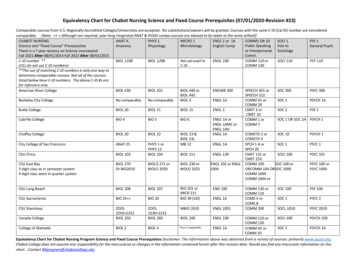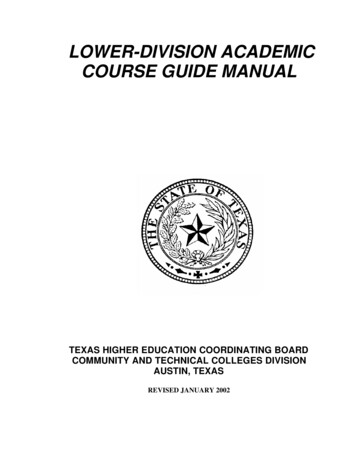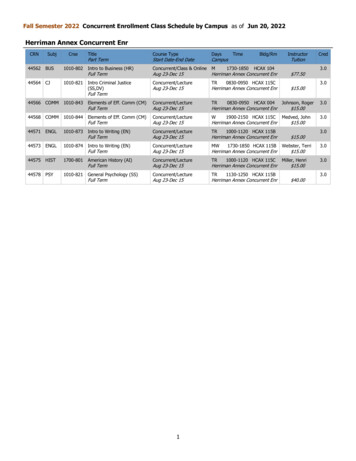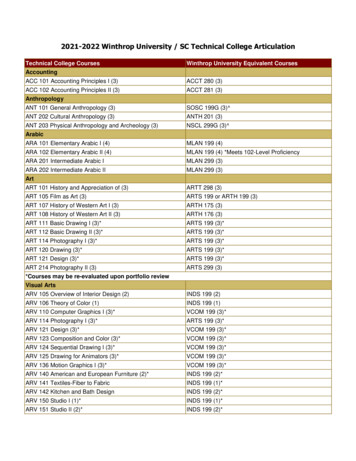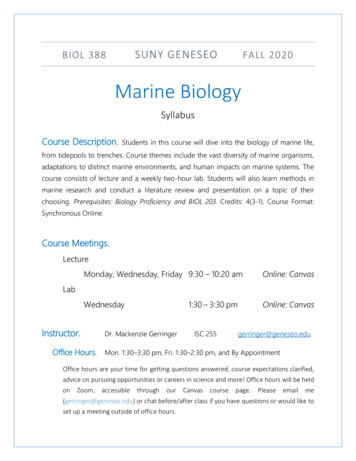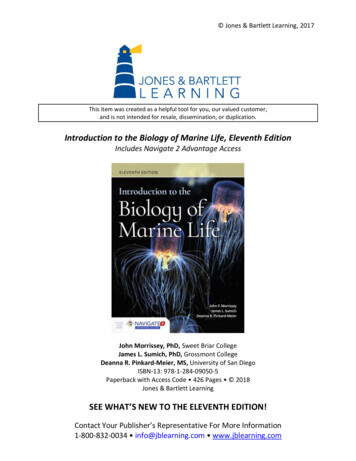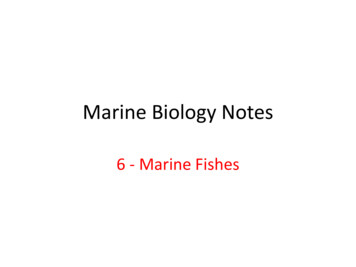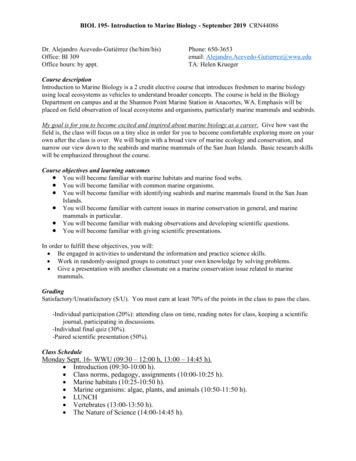
Transcription
BIOL 195- Introduction to Marine Biology - September 2019 CRN44086Dr. Alejandro Acevedo-Gutiérrez (he/him/his)Office: BI 309Office hours: by appt.Phone: 650-3653email: Alejandro.Acevedo-Gutierrez@wwu.eduTA: Helen KruegerCourse descriptionIntroduction to Marine Biology is a 2 credit elective course that introduces freshmen to marine biologyusing local ecosystems as vehicles to understand broader concepts. The course is held in the BiologyDepartment on campus and at the Shannon Point Marine Station in Anacortes, WA. Emphasis will beplaced on field observation of local ecosystems and organisms, particularly marine mammals and seabirds.My goal is for you to become excited and inspired about marine biology as a career. Give how vast thefield is, the class will focus on a tiny slice in order for you to become comfortable exploring more on yourown after the class is over. We will begin with a broad view of marine ecology and conservation, andnarrow our view down to the seabirds and marine mammals of the San Juan Islands. Basic research skillswill be emphasized throughout the course.Course objectives and learning outcomes You will become familiar with marine habitats and marine food webs. You will become familiar with common marine organisms. You will become familiar with identifying seabirds and marine mammals found in the San JuanIslands. You will become familiar with current issues in marine conservation in general, and marinemammals in particular. You will become familiar with making observations and developing scientific questions. You will become familiar with giving scientific presentations.In order to fulfill these objectives, you will: Be engaged in activities to understand the information and practice science skills. Work in randomly-assigned groups to construct your own knowledge by solving problems. Give a presentation with another classmate on a marine conservation issue related to marinemammals.GradingSatisfactory/Unsatisfactory (S/U). You must earn at least 70% of the points in the class to pass the class.-Individual participation (20%): attending class on time, reading notes for class, keeping a scientificjournal, participating in discussions.-Individual final quiz (30%).-Paired scientific presentation (50%).Class ScheduleMonday Sept. 16- WWU (09:30 – 12:00 h, 13:00 – 14:45 h). Introduction (09:30-10:00 h). Class norms, pedagogy, assignments (10:00-10:25 h). Marine habitats (10:25-10:50 h). Marine organisms: algae, plants, and animals (10:50-11:50 h). LUNCH Vertebrates (13:00-13:50 h). The Nature of Science (14:00-14:45 h).
BIOL 195- Introduction to Marine Biology - September 2019 CRN44086Tuesday Sept. 17- WWU (09:00 – 12:00 h, 13:00 – 14:45 h). Marine mammals (09:00-09:40 h). Food webs (09:40–10:10 h). Marine mammals and seabirds of the San Juan Islands (10:15–11:50 h). LUNCH Group pairing, topic choice, and presentation schedule (13:00-13:25 h). Nature of Science: questions and hypotheses (13:30–14:20 h). Getting ready for boat trips (14:20 – 14:45 h).Wednesday Sept. 18- Shannon Point Marine Center (08:00 – 16:00 h). Boat trip: observations, developing questions ( 09:00-12:00 h) LUNCH Develop questions and hypotheses (13:00-13:30 h). Share questions and hypotheses (13:30-14:00 h). Scientific presentations (14:00-15:30 h).Thursday Sept. 19- Shannon Point Marine Center (08:00 – 16:00 h). Boat trip: observations, refining questions ( 09:00-12:00 h). LUNCH Research at Western Washington University (13:00-14:00 h). Conservation of marine mammals (14:00-15:30 h).Friday Sept. 20 (9:00 – 12:00 h, 13:00 – 14.45 h). End of course quiz and review of scientific journal (09:00-10:00 h). Proposal presentations (10:15-11:50 h). LUNCH Proposal presentations (13:00-14:30 h)AssignmentRead Syllabus (Canvas/Files)Read files for 190916 (Canvas/Files/For 190916)Read For Conservation Topics (Canvas/Files/Assignments)Email me presentation partner, and topics of choiceRead files for 190917, skim seabirds (Canvas/Files/For 190917)Download files (Canvas/Files/ Boat Trips)Find two scientists at WWU (Biology, SPMC, MACSEnvironmental Sciences) doing marine research of interestRead file for 190919 (Canvas/Files/For 190919)Watch Steven Chew’s five videoson how to get the most out of studying by(https://www.youtube.com/watch?v RH95h36NChI&t 2s).Scientific Journal (Canvas/Files/Syllabus)Scientific Presentation (Canvas/Files/Assignments)DueMonday Sep 16 at 09:30 hMonday Sep 16 at 09:30 hTuesday Sep 17 at 09:00 h.Tuesday Sep 17 at 09:00 h.Tuesday Sep 17 at 09:00 h.Wednesday Sep 18 at 07:00 hThursday Sep 19 at 13:00 hThursday Sep 19 at 13:00 hFriday Sep 20 at 09:00 hFriday Sep 20 at 09:00 hFriday Sep 20 at 09:00 h
BIOL 195- Introduction to Marine Biology - September 2019 CRN44086-PresentationDue: Friday September 20th 09:00Aim: To develop science process skills by presenting a conservation-based report to non-specialists.hRationale: A critical skill required of scientists is the ability to convey information in a thoughtful,convincing and coherent manner in oral form. Many scientists are not skilled in giving clear and concisepresentations to other scientists, let alone to non-specialists such as funding, conservation or governmentalinstitutions. In this assignment, you will give a presentation to present a cohesive, concise and unbiaseddescription of the current status of knowledge on a particular issue AND to support your research proposal.Science is a creative process. Describing and attempting to understand the world involves generatingquestions, formulating explanations, conducting observations and experiments, and assessing thesignificance of the results obtained. In order to learn to develop our own ideas and become scientists wehave to be active research participants, not merely be told about the results of the work conducted byothers. One of the hardest and most beautiful things in science is to formulate a good research questionthat is testable. It is where science becomes a creative process, almost and art. Generating an interesting,exciting and important question begins with placing such question in the appropriate theoreticalframework: what is the problem to solve? Why is it important to solve this problem? To develop andstrengthen your confidence and experience in generating research ideas you will propose to conduct aconservation-based study on marine mammals. You will not actually conduct the study, but develop theidea based on your field observations, reading of scientific literature, and critical thoughts.Select a topic by 09:00 h on Tue Sep 17th. You will select a marine mammal conservation topic ofyour interest, but that is currently relevant. To identify a topic read the recommended readings on Canvas(file For Conservation Topics.pdf) and search online the databases available at Western (such as Web ofScience or Google Scholar). You need to identify three topics of interest that are specific (narrowenough that you could in theory conduct a scientific study on them) and rank them in order ofpreference, I will review the selection and assign the topic that is most relevant;Description:o You will give a concise and unbiased presentation on the conservation topic that you selected asthough it was given to government officials requesting information to make a management decision,this includes addressing biological, social and economic factors to justify your proposal and your ownopinion of what actions to take.o Notice that the topics will refer to an event or human activity and a marine mammal taxon or taxa.Your unbiased description should include the point of view from both components. That is, theimpacts of a certain activity on the taxa but also the opinion of the stakeholders or carriers of theactivity.o Your presentation should include a brief description of the research that you propose to address theconservation issue.o Please use publications from scientific journals that are peer-reviewed as references. (When in doubt,check the website for the journal or contact me.) There are many recent peer-reviewed publications souse them. Look in the following places for references: One Search Advanced or Web of Science (boththrough Western Libraries), Google Scholar, the starter references, the literature cited in the scientificpapers your read and the literature cited in the books recommended on the syllabus. Let me know ifyou find a reference but cannot access it, I may be able to get the pdf file for you.o Do check what everyone else is presenting to avoid overlap in presentations. This is particularlyimportant if your presentation addresses marine mammals in general and not a particular species.o You and your partner will have 10-12 min for the presentation and 3 min for questions, you will be cutoff after this time.o You will have to prepare, practice, and be ready to answer questions from the audience.o I will need to receive the final file of the presentation at 9 h on the presentation day: Friday September20th.
BIOL 195- Introduction to Marine Biology - September 2019 CRN44086RUBRIC OF THE PRESENTATIONOrganization(3 points)Is there are short,descriptive title?Is the name ofthe presenterincluded?Is talk restrictedto topic at hand?Is it clear whatthe talk is about?Are thereconclusions atthe end?Are theconclusionsclear, supportedby evidence andrelated to topic?Structure(4 point)Does thetalk follow alogicalsequence?Is contentaccurate?Completeness(5 points)Is the conservationproblem clearly stated?Are the two sides of theconservation problemdiscussed equally?Is there a researchproposal that addressesthe problem?Is there at least a caseexample for theproblem?Are there suggestedconservation actions?Are studies cited inslides to supportstatements made?Are studiesacknowledged at theend using the format ofConservation Biology?Appearance(4 points)Is there consistency in thetalk (background, font,etc.)?Is the amount of material ineach slide appropriate?Is the font size largeenough?Is the font type easy to read?Is the spelling correctthroughout the presentation?Is there enough contrastbetween text andbackground?Are the figures and tableslarge enough?Are sources of figures andphotos acknowledged?Are new terms explained?Performance(2 points)Is the pace of the talkappropriate?Is the volume sufficient?Does the speaker use thenatural resting position?Are hands usedappropriately?Time(2 point)Is thereenoughtime forquestions?Is the talklongenough?Is there frequent eyecontact with allaudience?Does the speaker usepauses instead of fillers?Does the speakerenunciate clearly?Does speaker appearconfident?Are questions answeredappropriately?See student examples on Canvas/Files/Assignments/Presentations.-Boat TripsWednesday and Thursday September 18th and 19thAim: To develop science process skills by observing and developing scientific questions, and to be excitedabout the marine envioronment.To bring:-Outdoor clothing for cold and windy weather, including a rain jacket.-Comfortable shoe wear, which may get wet.-Water bottle with water.-Snacks, if you need more than breakfast and lunch.-Cell phone with e-documents from Canvas.-Scientific journal and writing utensils (developing questions).-Camera (if you have it).-Binoculars (if you have them). We will bring some to share.We will depart at 07:45 h. We will pick sack breakfasts & lunches from the university.
BIOL 195- Introduction to Marine Biology - September 2019 CRN44086-Scientific JournalDue: Friday September 20th 09:00 hScientist must keep careful notes and drawings about their initial observations, ideas, questions,experimental designs, environmental factors, and results. Keeping a good notebook is a very important partof doing science. You should treat your notebook as a journal (a place to record your observations,questions, and thoughts), a data record, and an assignment (a place to answer assigned questions).For your Journal:1. Start with a Table of Contents. Leave at least two full pages at the beginning of your journal for yourtable of contents. This section should contain the page numbers for daily reflection entries (see #4 below),data collection, notes, answers to assigned questions, and date. Entries should be clearly labeled for whichdaily assignment or topic they are associated with. For example:TABLE OF CONTENTSDateAssignment/ContentPage(s)9/9/13Class notes on Life Habits of Organisms5-89/9/13Shannon Point field observations and data9-139/9/13Daily Reflection for Monday, Sept 9, 201314-152. Number every page in your journal.3. Be organized. Title each entry in your Journal with date and the assignment name or purpose. Yourinstructors should be able to use your Table of Contents and find where entries start on particular pages.Try to keep your assignments in order and multiple parts of an assignment together as much as possible.4. At the end of each day, create an entry for a Daily Reflection, which includes:a. an account of everything you did that dayb. the main marine science concept(s) covered that dayc. at least one thing that excited or interested you from the day and why. For example, you couldwrite about something you learned that you didn’t know before, thought was really cool, etc.d. at least one thing you still wonder about topics from the day5. Demonstrate the time and effort you’ve spent in class or in the field. Quality and detail matter! Be thorough.6. Write clearly. When answering assigned questions or composing daily reflections, write in completesentences. (When taking your own notes and observations in the field, some amount of scribbles is ok.)7. Drawings should follow the following guidelines:Scientific drawings are an important part of biology. Drawings allow you to record an image of anorganism you’ve observed and document the important features of the organism. Drawings are also used toshare your observations with someone else. You don’t have to be a good artist to make a good scientificdrawing! The goal of the drawing is to provide information in an efficient manner. (A picture is worth athousand words, as they say!) During this class, whenever you are asked to draw something, it shouldfollow the scientific illustration format as much as possible.1. Observe your phenomenon (or organism) carefully. What are important features or behaviors of theorganism? For example, what makes it different than another organism that might be similar? What isthe shape of the organism’s body? Does it have legs? How many?2. Draw only what you see. (Do not include what you think you should see!)3. Drawings should be done in pencil. If you do not use color, make sure to describe it in detail,4. Drawings should be large and clear so important features can be easily seen.5. Use distinct, single lines. (Avoid sketching.)6. All drawings should include:a. Title & information (For example, the organism’s name, the date and conditions you observed it)b. Size scalec. Labels pointing to important features using straight lines that do not overlapd. Descriptions of texture, smell, behavior, color (if needed), and other observations
BIOL 195- Introduction to Marine Biology - September 2019 CRN44086Inclusiveness and RespectYou are encouraged to speak up and participate during class. Because the class will represent a diversityof individual beliefs, backgrounds, and experiences, each one of us will respect, appreciate, and embraceevery other member of this class.I am firmly committed to diversity and equality in all areas of life. In this class, I will work to promote aninclusive environment where everyone feels safe and welcome. I recognize that discrimination can bedirect or indirect and take place at both institutional and personal levels. I believe that such discriminationis unacceptable and I am committed to providing equality of opportunity for all by eliminating any and alldiscrimination, harassment, bullying, or victimization. The success of this policy relies on the support andunderstanding of everyone in this class. We all have a responsibility not to be offensive to each other, orto participate in, or condone harassment or discrimination of any kind. Without failing to speak up, wealso have the opportunity to think the best of everyone and give one another the benefit of the doubt.Equal Opportunity RightsYou have the right to an educational experience that is free from illegal harassment or discrimination onthe basis of race, color, creed, religion, national origin, sex, disability, age, veteran status, sexualorientation, gender identity or expression, marital status or genetic information. If you believe you haveexperienced harassment or discrimination, inform me, an instructor you feel is an ally, one of the twoBiology faculty members on the College’s Equity, Inclusion, and Diversity Committee (Ben Miner andJosé Serrano-Moreno), or using the anonymous form under the Equity and Inclusion tab on the BiologyDepartment homepage: ion-issues-biology#overlaycontext biologyIntellectual HonestyScience is based on trust. If a scientist states that she carried out a particular study and obtained certainresults, the rest of us trust that she did such thing. This is one reason why there is no tolerance for peoplewho are not intellectually honest, and this class will be no exception.https://wp.wwu.edu/academichonesty/From WWU: Plagiarism is presenting as one's own in whole or in part the argument, language, creations,conclusions, or scientific data of another without explicit acknowledgement. Examples include but are notlimited to: Using another person's written or spoken words. Using information from a World Wide Web site, CD-ROM or other electronic sources. Using statistics, graphs, charts and facts without acknowledging the source of the ideas. Paraphrasing, which is using someone else's argument without acknowledging the source byimitating the argument using other words.Understanding and Avoiding PlagiarismReligious AccommodationsWestern provides reasonable accommodation for students to take holidays for reasons of faith orconscience or for organized activities conducted under the auspices of a religious denomination, church, orreligious organization. Students seeking such accommodation must provide written notice to their facultywithin the first two weeks of the course, citing the specific dates for which they will be absent.“Reasonable accommodation” means that faculty will coordinate with the student on schedulingexaminations or other activities necessary for completion of the course or program and includesrescheduling examinations or activities or offering different times for examinations or activities.
BIOL 195- Introduction to Marine Biology - September 2019 CRN44086Additional information about this accommodation can be found in SB 5166:Providing religious accommodations for postsecondary students.ResourcesDo you have any concerns about your ability to learn in the classroom or your ability to take assessmentsin the classroom? Contact the Disability Access Center for advice, help, and to request accommodation(650-3844 or https://disability.wwu.edu/).Do you feel unwell or have a health-related question? Contact the Health Center (650-3400) or visit thewebsite of Student Health (http://www.wwu.edu/chw/student health/).Do you have an emotional or psychological concern or question? Contact the Counseling Center (6503400) or visit the website of Counseling Services (http://www.wwu.edu/counseling/).Do you have a safety concern? Contact the University Police (650-3555) or visit their Do you have a family or personal crisis or emergency? Contact the Dean of Students (650-3450) or visittheir website (https://wp.wwu.edu/students/).Have you or someone you know experienced bias of any kind on campus? Contact the Equal OpportunityOffice for advice and help. ml).Do you have concerns related to being an undocumented student? Contact Student Outreach nts/).Do you have financial difficulties? Go to the Financial Aid Services Center and schedule an appointmentwith a financial aid counselor (http://www.finaid.wwu.edu/client services/pages/contact.php)Do you identify as a member of the LGBTQ Community? Learn about resources and support byemailing L. K. Langley (they/them/theirs) at L.K.langley@wwu.edu or by visiting https://lgbtq.wwu.edu/Do you or someone you know need confidential support related to sexual violence? Contact CASAS (6503700 or t-support-casas), the Student Health Center,and/or the Counseling Center.To report sexual violence, please contact University Police, Bellingham Police, and/or the Title IXCoordinator in Western’s Equal Opportunity Office (650-3307). Faculty are required to report sexdiscrimination, including sexual violence that they learn about to the Title IX Coordinator.Are you or someone you know in distress? Help is available anytime, all the time.https://suicideprevention.wwu.edu/get-help/
Introduction to Marine Biology is a 2 credit elective course that introduces freshmen to marine biology using local ecosystems as vehicles to understand broader concepts. The course is held in the Biology Department on campus and at the Shannon Point Marine Station in Anacortes, WA. Emphasis will be
